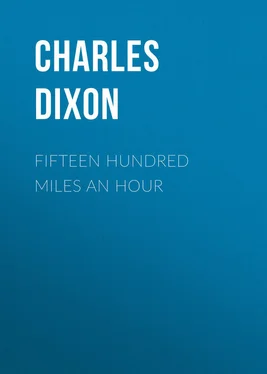Charles Dixon - Fifteen Hundred Miles An Hour
Здесь есть возможность читать онлайн «Charles Dixon - Fifteen Hundred Miles An Hour» — ознакомительный отрывок электронной книги совершенно бесплатно, а после прочтения отрывка купить полную версию. В некоторых случаях можно слушать аудио, скачать через торрент в формате fb2 и присутствует краткое содержание. Жанр: foreign_antique, foreign_prose, на английском языке. Описание произведения, (предисловие) а так же отзывы посетителей доступны на портале библиотеки ЛибКат.
- Название:Fifteen Hundred Miles An Hour
- Автор:
- Жанр:
- Год:неизвестен
- ISBN:нет данных
- Рейтинг книги:4 / 5. Голосов: 1
-
Избранное:Добавить в избранное
- Отзывы:
-
Ваша оценка:
- 80
- 1
- 2
- 3
- 4
- 5
Fifteen Hundred Miles An Hour: краткое содержание, описание и аннотация
Предлагаем к чтению аннотацию, описание, краткое содержание или предисловие (зависит от того, что написал сам автор книги «Fifteen Hundred Miles An Hour»). Если вы не нашли необходимую информацию о книге — напишите в комментариях, мы постараемся отыскать её.
Fifteen Hundred Miles An Hour — читать онлайн ознакомительный отрывок
Ниже представлен текст книги, разбитый по страницам. Система сохранения места последней прочитанной страницы, позволяет с удобством читать онлайн бесплатно книгу «Fifteen Hundred Miles An Hour», без необходимости каждый раз заново искать на чём Вы остановились. Поставьте закладку, и сможете в любой момент перейти на страницу, на которой закончили чтение.
Интервал:
Закладка:
"Well, then, Temple, the first difficulty I had to contend with was that of bridging the mighty distance between our Earth and this planet. My second task was the enormous journey itself, and the means of obtaining air and sustenance during the progress. Both of these, after many experiments and many failures, have been overcome.
"First, as to my means of conveyance. I have here a design for an air carriage, propelled by electricity, capable of being steered in any direction, and of attaining the stupendous speed of fifteen hundred miles per hour. It can be made large enough to afford all necessary accommodation for at least six persons, and its attendant apparatus is capable of administering to their every requirement. Here is a model of the machine. You will perceive that the material of which it is composed is no metal in common use, nor is its composition, and the method of its manufacture, known to any mortal man but myself. It is remarkable for its extreme lightness, toughness, and power of withstanding heat. Wrought-iron melts at something like 4,500 degrees Fahrenheit; my metal will stand a fiery ordeal three times as great. This is of the utmost importance, for our high rate of speed would soon generate sufficient heat to melt any but the most enduring substance. Here, again, is the exact model of another apparatus for making and storing electricity sufficient for at least two years, working at high pressure. And herein perhaps is the greatest of my discoveries. The one grand problem which electricians have to solve before this force can be of any great advantage to mankind is the method of generating it direct, without the aid of any other motive power. I have solved that problem; and have succeeded by the aid of this curious apparatus in producing electricity direct, not from coal, but from petroleum. By this wonderful invention I am able to carry enough fuel for our journey, compressed into a space that is practicable for all requirements, and the alarming waste of energy that now troubles the electrical engineer is saved. The labour of the world will now be revolutionised when I choose to make my discovery known; for the reign of steam, glorious and wonderful as it has been, will then be over. I can carry in my hand enough fuel to drive the biggest steamer that ploughs the ocean, once round the world.
"But to return. This little attachment tells the exact rate of speed the carriage is travelling. You will also perceive that my motors are on the principle of the paddle-wheel and the screw-propeller combined. The interior of my carriage is formed of a series of chambers one above the other. There is a laboratory, sleeping and living chambers, engine and apparatus room, and ample space for stores in the basement. The door is situated near the top, and just above it I have placed, as you see, a small balcony, for observations. My port-holes will be glazed with glass of exceptional quality, made by myself, and every apartment is lighted with electricity. The carriage is conical in form, that shape being best adapted to a high rate of speed.
"My next consideration was the supply of air. I think we shall find that the whole planetary system is pervaded with an atmosphere so rare, in some parts of remotest space, as to remain undetected by any instrument yet known to science, but still of sufficient density to offer resistance and lend support to our carriage and its propellers. My condensers are so formed that they will readily convert this ether into air suited to man's requirements.
"I had now but one more task to overcome – food and water. As regards food, I have here a little cake of animal and vegetable substances which have undergone a certain chemical process, by means of which I have been able to compress enough food to support a human being for three days into a space not quite two cubic inches in extent. In this other tablet I have dealt with wheaten flour in a similar satisfactory manner. Tea, sugar, and other luxuries I can reduce to the smallest proportions by a process of condensation and hydraulic pressure. So that I can stow away in the store-room of my carriage enough food to last six persons for nearly three years – a more than ample supply, as I intend shortly to demonstrate.
"It has taken me nearly ten years to solve the problem of my water supply. I have here a small electrical apparatus, by means of which I hope to be able to distil water from ether. Should my experiment fail, I have invented a small lozenge of soda and other chemicals, which will allay thirst. I must also say that I have allowed sufficient space for scientific instruments, a stock of methylated spirits, a selection of books, firearms, and ammunition: nor have I omitted clothes, cigars, tobacco, a few bottles of wine to be used on state occasions, and a fair quantity of brandy and whiskey, so that you, Temple, shall not be without your grog. A medicine chest, camera, and india-rubber boat are also included in my list of necessaries. I calculate that my air-carriage will be about forty feet in height, and nine feet in width. What I have disclosed is but a portion of my grand scheme, the one great work of my life, from which I hope to obtain the most brilliant scientific results.
"The planet Mars will reach his perihelion, or nearest distance to our Earth, in October, 1877. He is then in an unusually favourable position, and affords us a chance of visiting him, which will not occur again in a lifetime. Now, I calculate that our rate of speed will be fifteen hundred miles per hour, so that the thirty-four millions of miles we have to traverse will be accomplished in about two and a-half years' time. We must leave Earth, therefore, not later than the first day of May, 1875. Our stay, of course, will depend on circumstances, which no mortal man can foresee. We may, indeed, reach our destination in much less time than I have anticipated.
"I ought here to mention," continued the Doctor, "that my devoted servant, Sandy, has already expressed his desire and willingness to accompany me on this long journey.
"Now, Temple, and you too, Graham, I wish you to weigh carefully the pros and cons of this dangerous enterprize. We are about to embark into the solemn, boundless realms of space – to dash boldly away from the Earth, which fosters us, into mysterious regions of which we have none but the scantiest knowledge. On the other hand," continued the Doctor, "there is grandeur in the thought of being able to leave this world of ours for a season, and to visit those orbs which shine so clearly in the midnight sky. If you, of your own free will, are ready and willing cheerfully to cast in your lot with mine, I shall be happy in your company."
There was dead silence for several moments after the Doctor had finished speaking, during which the little timepiece on the mantel struck the hour of midnight with almost painful clearness, when Graham was the first to speak.
"Doctor, you know that, through all the experiments we have conducted together, my one aim has been, provided they were successful, to accompany you."
Temple spoke next.
"The ties, my dear Doctor, that bind me to Earth and to life are small. Wifeless, childless, relationless, what have I to look forward to? I freely place at your disposal the sum I have already named, and at the same time pledge myself to make your – shall I say OUR – journey a success."
"I thank you, friends, for your kindness, and your proffered assistance, and accept the offer of your company with unqualified pleasure. It is now November. All our preparations must be made during the next six months, that is by the end of April. We must leave Earth no later than that date. I also suggest that all our preparations are made as secretly as possible. Let the carriage be made in sections and parts; let all be brought here, bit by bit. My big barn will suit us for a workshop. Idle curiosity must not be excited. And, as a personal favour, I request that no hint of this journey be given to any mortal man."
Читать дальшеИнтервал:
Закладка:
Похожие книги на «Fifteen Hundred Miles An Hour»
Представляем Вашему вниманию похожие книги на «Fifteen Hundred Miles An Hour» списком для выбора. Мы отобрали схожую по названию и смыслу литературу в надежде предоставить читателям больше вариантов отыскать новые, интересные, ещё непрочитанные произведения.
Обсуждение, отзывы о книге «Fifteen Hundred Miles An Hour» и просто собственные мнения читателей. Оставьте ваши комментарии, напишите, что Вы думаете о произведении, его смысле или главных героях. Укажите что конкретно понравилось, а что нет, и почему Вы так считаете.












